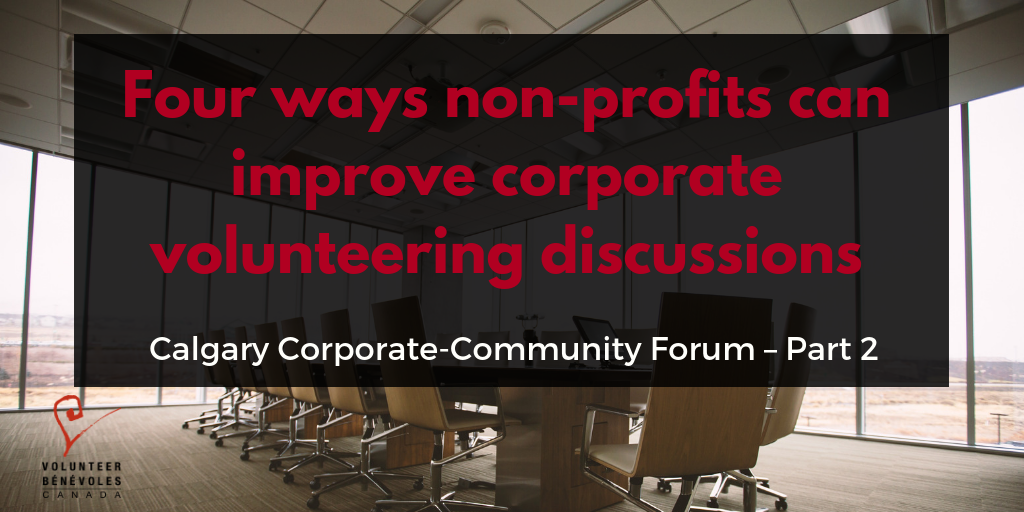
Calgary Corporate-Community Forum – Part 2
Changing the conversation: The second of a 3-part blog, based on a Calgary meeting of non-profits and companies to discuss corporate volunteering
Volunteer Canada held the semi-annual Corporate Council on Volunteering (CCOV) Gathering in Calgary, May 28 and 29. The Council invited non-profits to join them on the first day in a Forum so that, together, they could discuss best ways to work together to engage employee volunteers. In this 3-part blog we share some of the key learnings.
To a community organization, every company is a potential donor.
This has been the nature of their relationships since there have been non-profits and companies. As organizations that work with small margins and short-term funding, writer Rahim Kanani reminds us that non-profits are “dependent on charitable contributions…They rarely have enough money for programs, much
As a result, when a company representative – whether the head of CSR or, more often, a regular rank and file employee who is organizing an event for a team – comes to a non-profit asking for a volunteering opportunity for employees, the fundraising mindset often gets activated in that non-profit. As explored in the May Corporate-Community Forum in Calgary, hosted by Volunteer Canada’s Corporate Council on Volunteering, non-profits examine the request through the lens of how the corporate relationship can advance the non-profit mission. This often includes both how the volunteer activity can impact the mission and how the relationship, if cultivated, might bring dollars beyond covering the costs of the volunteer activity.
With this fundraising mindset, the accompanying dynamics of the power imbalance can also be activated. In the perceived power disadvantage, non-profits often feel they cannot assert agency to shape the nature of the relationship in the way that would be most advantageous, such as suggesting a different volunteering activity than what the company has requested or turning down a request entirely.
As discussed at the Corporate-Community Forum, company representatives need to be trained to be sensitive to power dynamics, how to frame a reasonable request, and how to manage their side of the volunteering activity. NFPs need to develop skills and competencies to ensure volunteering advances their mission:
- Value their own assets and opportunities. A volunteering experience is very valuable to a company. It is widely understood that community engagement increases employee recruitment, retention and engagement. It helps build teams. It builds employee skills. It can build a brand. Opportunities are formally supported by most large and many small and medium companies and are integrated into their community and/or HR strategies. Employees are generally inexperienced – they don’t know how to help a cause and want to do it with a community partner. Non-profits need to recognize that they have more power in the potential relationship than in a fundraising relationship. They have the ability to shape volunteering projects into what serves their mission best, either by negotiating with a company who has come to them or, as several organizations at the Forum have done, pro-actively seeking out corporate relationships for employee skills sets and vision alignment.
- Audit organizational needs that can be filled by different sizes of volunteering groups and length of commitments. Many non-profits at the Forum found that creating a list of potential group volunteering activities helped create internal alignment and readiness for requests from companies. Often these lists are updated seasonally.
- Reach internal consensus on when and how to work with companies. Stories were shared of friction between volunteer management staff and other staff on how to work with a new corporate request or the request of a current donor to volunteer. For example, requests that really didn’t advance the community organization’s mission were accommodated if it was a perceived this would lead to a donation. In a climate of increasing requests from companies, policies and approaches need to be formalized in non-profits.
- Assert their prerogative to decline offers of support from companies. Whether it is a volunteer, financial, or some other kind of support, the non-profit’s values and mission should be used to signal when it is time to decline an offer. Ideally, this is done with an explanation to the company representative about how the offer doesn’t align with values, mission, current capacity, or whatever the reason, and what might be changed – if anything – to create that alignment.
When the match of volunteers-to-needs works between non-profits and companies, both have a responsibility to ensure costs are recognized and reconciled. This topic will be explored in the third and final installment in this series on the May Calgary Corporate-Community Forum which will be published on November 22nd, 2018.
